

China has reached a point where the country is able to make key technological breakthroughs within three or five years, despite rising restrictions from the US, said a former World Bank chief economist.
"China will not stop developing just because other countries try to restrict it," said Justin Yifu Lin, dean of Peking University's Institute of New Structural Economics, in an interview with China Daily.
The remarks were made as the US has been adding Chinese firms to a so-called entity list, an export blacklist, trying to suppress China's rising technological prowess.
With enough talent and resources, China now can make breakthroughs in innovations quickly. No matter how hard the tech is, the country will go through it if it remains dedicated," he said.
"The restrictions will not hinder the country's goal in realizing high-quality development," he added.
After the Beijing International Youth Innovation and Development Forum, three guest speakers from different countries shared their study, life and work experiences with the forum's host. Clementine Ebel, a student of Yenching Academy at Peking University, said she would never forget the first night when she arrived in Shanghai as she was left amazed by the development of China. She was also invited by an owner of a startup company in Xiong'an New Area to experience the latest development of the country.
To learn more, click the video.
The "2024 Global Youth Science and Technology Innovation Development Report" was released at the Beijing International Youth Innovation and Development Forum on April 28th. According to the report, China attaches great importance in the development of the youth and supporting young talents to assume important responsibilities in scientific and technological innovation.
Young people are the future of the planet and will shape the society of the future, said Didier Queloz, winner of the 2019 Nobel Prize in Physics.
Queloz, who is also Professor of Physics at the University of Cambridge and ETH Zurich, shares his enthusiasm for science and research with young people.
He invites them to meet people who spend their time trying to understand how the world works and those who are trying to prepare tomorrow's society.
The Beijing International Youth Innovation and Development Forum was held on Sunday at the Zhongguancun International Innovation Center in Beijing. This year's theme revolved around the key elements of youth innovation and development.
Youth Talks was the final segment on the forum's agenda. Shi Futian, host of Youth Talks and China Daily journalist, invited five youth representatives from diverse backgrounds and industries to share their stories and insights about cultivating innovation in the next generation.
Chai Xiangfei is founder and CEO of Huiying Medical Technology Company, a company contributing to digitization and smart technology in the medical field. Reflecting on his nine years of entrepreneurship in Beijing, he noted the openness of the city and the passion for innovation among talent here. Chai said they are not confined to traditional industries and professions, but are eager to take on challenges and new industries.
Wahed Ahmadzai, founder of startup NHub and secretary-general of nonprofit Alumni Talent Alliance, pointed out the deepening and evolving meaning of entrepreneurship.
"It's about taking responsibility, solving problems, creating innovative solutions that benefit society as a whole, and establishing ventures that are well aligned with market needs," he said.
Ahmadzai emphasized the importance of collective efforts from governments, businesses and educational institutions in fostering innovation and supporting the next generation. He also said we should guide and inspire the younger generation to engage in entrepreneurial dialogue early on. "Universities and large corporations must provide more targeted support and real-world experience for the younger generation, including a school-enterprise incubation system," he said.
Dylan Walker, a journalist at China Daily, also underscored the significance of creating an environment where youths feel empowered to pursue their ideas. "Innovation often springs from daring risks and learning from failures," Walker said.
Walker also stressed the indispensable role of studying abroad in youth development. "It broadens perspectives, fosters adaptability, and enhances cross-cultural communication skills. By experiencing diverse educational environments, we cultivate independence, creativity and resilience," he said.
Clementine Ebel, a teaching scholar at Peking University, shared her belief that a single innovation has an exponential impact, as it may inspire others to come up with new ideas and creations.
Over the past five years, Ebel created more than 10 curricula, taught over 300 students, and helped over 100 teaching staff members overcome intercultural challenges. She said the core of innovation consists of observation, investment in the subject, and constant experimentation. Ebel also said that for youths, the discovery of an answer is not the finish line, but a starting point in a quest for more questions.
Gong Wentong is founder and CEO of Xiong'an Xingyuan Technology Company. The company is located in Xiong'an New Area, a state-level new area that serves as a developmental hub for the Beijing-Tianjin-Hebei economic triangle.
Gong said entrepreneurs in the area are predominantly from Generation Y and Generation Z. He pointed out that these young talent possess an open mindset, diverse backgrounds, thirst for knowledge, and are adventurous and adaptable to the constantly changing global landscape.
Gong emphasized that in the future, the world will continue to undergo technological revolution, digital transformation, and modernization in education. He stressed that youth innovation is a driving force in these trends and changes, and that society should provide them with more support and opportunities.
lixinran@i21st.cn
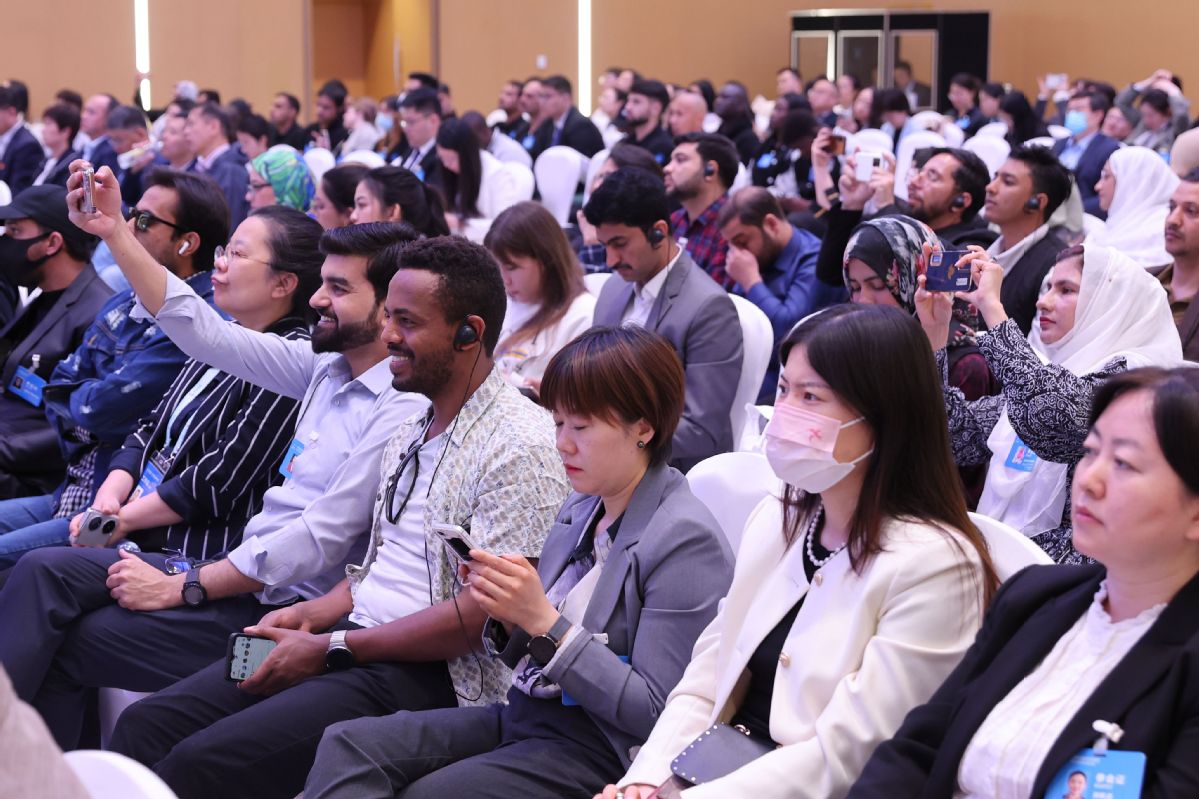
The integration of industries, education and research is essential for gathering the power of the youth and promoting innovation development, experts said on Sunday at the Beijing International Youth Innovation and Development Forum.
Fang Fang, vice-president of Peking University, said higher education institutes are the intersections where education, technology and talent converge.
Peking University has introduced a group of academic leaders and outstanding young scholars to build its faculty structure, Fang said in remarks at the forum.
Over the past five years, PKU has recruited over 600 teaching and research staff members from overseas, among which 90 percent were young talent under 40 years old, strengthening the university's talent pool, Fang said.
"The university has cooperation with nearly 400 universities and institutions in over 70 countries and regions worldwide. It maintains close collaborations with more than 80 globally renowned universities," Fang said.
Moreover, it has been cooperating with research institutes to cultivate talent and actively engage with major research institutions in Beijing's Changping and Zhongguancun for talent training and research personnel recruitment, he said.
To advance the transformation of scientific and technological achievements, the university, in partnership with the Beijing municipal government, has established seven new research and development institutions, including disciplines like artificial intelligence and neuroscience.
Olli Suominen, education and science counselor at the embassy of Finland in China, highlighted the importance of education equality for the innovation development of young people.
Although innovation capability can be seen as part of high-end development for highly educated geniuses, innovation is not a characteristic of only a few creative geniuses, Suominen said.
"Everyone can and should be creative and innovative both at work and in everyday life," he said.
The Finnish education system incorporated critical thinking and innovation skills into its mandatory curriculum and everyday teaching. "The emphasis in critical and innovative thinking is on cultivating the students' ability to work together," Suominen said.
Biljana Jelacic, executive vice-president of human resources at Mercedes-Benz Group China, said Chinese researchers have contributed to major projects of Mercedes-Benz.
With 2,000 experts, Mercedes-Benz's China R&D team has led projects such as the L2+ automated driving function on the new long-wheelbase E-Class, and it is the primary contributor to developing MB.OS, the proprietary operating system of the group.
Last year, the company conducted exchanges with 200,000 young talent through various channels, including campus recruitment and its newly upgraded "Elite Management Trainee Program" for Chinese youth.
According to research by Deloitte China, high-quality living conditions, public platforms and social community are important factors that young talent need for innovation and entrepreneurship.
Norman Sze Nung Chi, vice-chairman of Deloitte China, said high-level talent prefer flats and serviced apartments ranging from 30 to 50 square meters per capita. They also seek quality and convenience in facilities such as international hospitals and schools.
Data support from industrial parks can help startups obtain more information, while government subsidies remain the most anticipated financial support for technology enterprises, he added.
There is a growing desire among young talent for facilities like running tracks and open spaces, which are vital for relieving stress and achieving work-life balance.
Gan Lu, secretary-general of BIC Euronova Greater China, said the organization aims to further deepen cooperation between China and Europe in cultivating young talent, as well as development in climate and artificial intelligence.
Gan said the organization will invite university students from both Europe and China's Greater Bay Area to participate in a knowledge competition about peak carbon emissions and carbon neutrality this year.
zhaoyimeng@chinadaily.com.cn
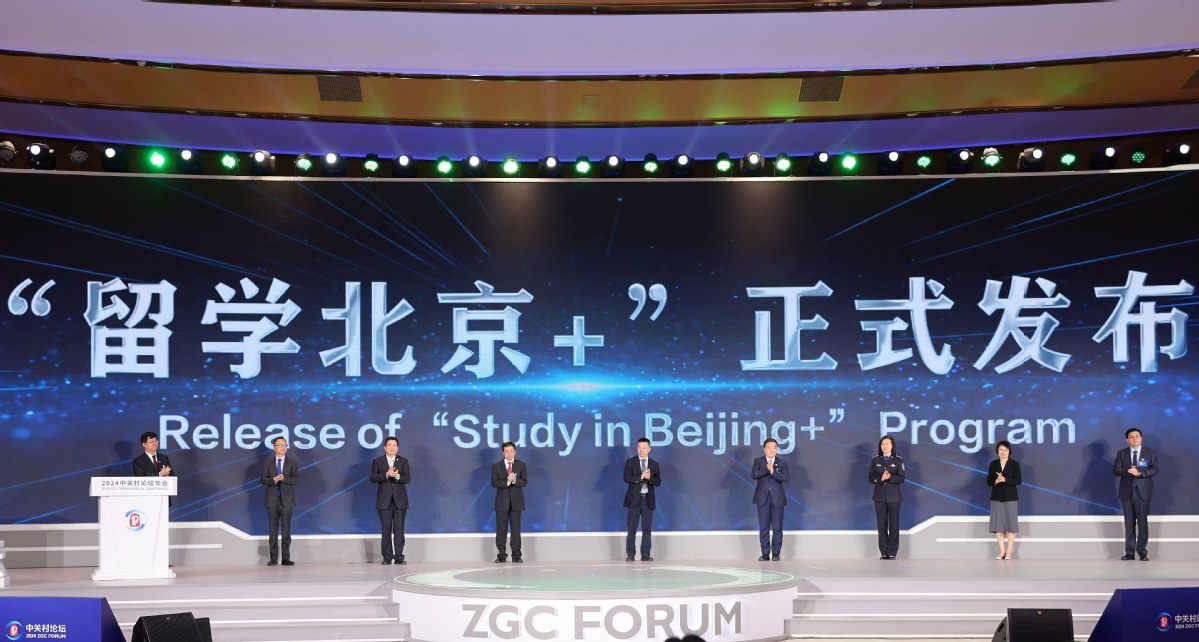
Beijing aims to lead youth around the world in technological innovation and development by ramping up efforts to foster innovation and entrepreneurship, as well as enhancing international scientific and technological collaboration, according to a new report released on Sunday.
The 2024 Global Youth Science and Technology Innovation Development Report suggests that more attention is needed to meet the basic living, leisure and relaxation needs of young talent, so as to enhance competence and creative innovation in the Chinese capital.
The report was unveiled at the Beijing International Youth Innovation and Development Forum, held in parallel with the 2024 Zhongguancun Forum.
Led by Zhai Kun, associate dean of the Institute of Area Studies at Peking University and lead author for the report, it illustrates the technological innovation development of youth with rich data, detailed case studies and cutting-edge theories.
The report focuses on the advantages, roles and specific practices of youth by promoting sustainable innovation and accelerating the development of new quality productive forces, Zhai said.
Young people are the backbone of technological innovation, and artificial intelligence is leading the global trend of technological innovation, the report said.
China has been supporting young talent by playing significant roles in technological innovation. Young people have become the main force in the development of core technologies in China.
For instance, the average age of the design and development team for the Fuxing high-speed train is 38 years old, while that of Chinese aerospace engineering teams is younger than 35, the report said.
The report also delves into how Beijing is constructing an international science and technology innovation center by gathering talent, supporting entrepreneurship, and connecting talent domestically and internationally.
Beijing's Haidian district boasts the most concentrated intellectual resources in the country, with a talent pool of nearly 2 million people, accounting for over one-fourth of the capital's total.
Among the working-age population, 76.8 percent have received higher education, surpassing the citywide average by 20 percentage points and is on par with Silicon Valley in the United States, the report said.
Beijing is expected to fully leverage its advantages in educational technology and talent, focusing on nurturing young talent and promoting technological innovation.
Higher education institutes and think tanks need to enhance the training of young talent in key areas such as ChatGPT, genomics, 4D printing and nanotechnology, the report said.
Increasing efforts should be made to discover and support high-potential talent through initiatives like starting talent training as early as possible and increasing the proportion of youth-led research projects with funding, so as to provide long-term support for outstanding young scientific talent.
Joint funds are expected to bridge the gap between enterprises and researchers from universities and research institutes, providing a platform for young scientists to exchange ideas and effectively collaborate.
Universities and enterprises are encouraged to deepen their participation in international scientific and technological cooperation by establishing laboratories and research institutions abroad.
Research institutes in Beijing should continue to collaborate with international counterparts to apply for joint funds and carry out research in areas such as artificial intelligence, 6G and advanced manufacturing, the report added.
zhaoyimeng@chinadaily.com.cn
Clementine Ebel, a student of Yenching Academy at Peking University, spoke at the Beijing International Youth Innovation and Development Forum on Sunday about the difficulties faced by Chinese international students, and provided her advice to address those challenges.
Dylan Austin Walker, reporter for the 21st Century of China Daily, said at Beijing International Youth Innovation and Development Forum on Sunday that he believes in driving innovation, nurturing development, and allowing young people to propel progress with their ideas, passion, and creativity.
Committed to empowering young individuals, Wahed Ahmadzai from Afghanistan said at the Beijing International Youth Innovation and Development Forum on Sunday about integrating innovative culture, resource training, and incubation ecosystems to activate youth entrepreneurial culture and assist them in creating a brighter future.
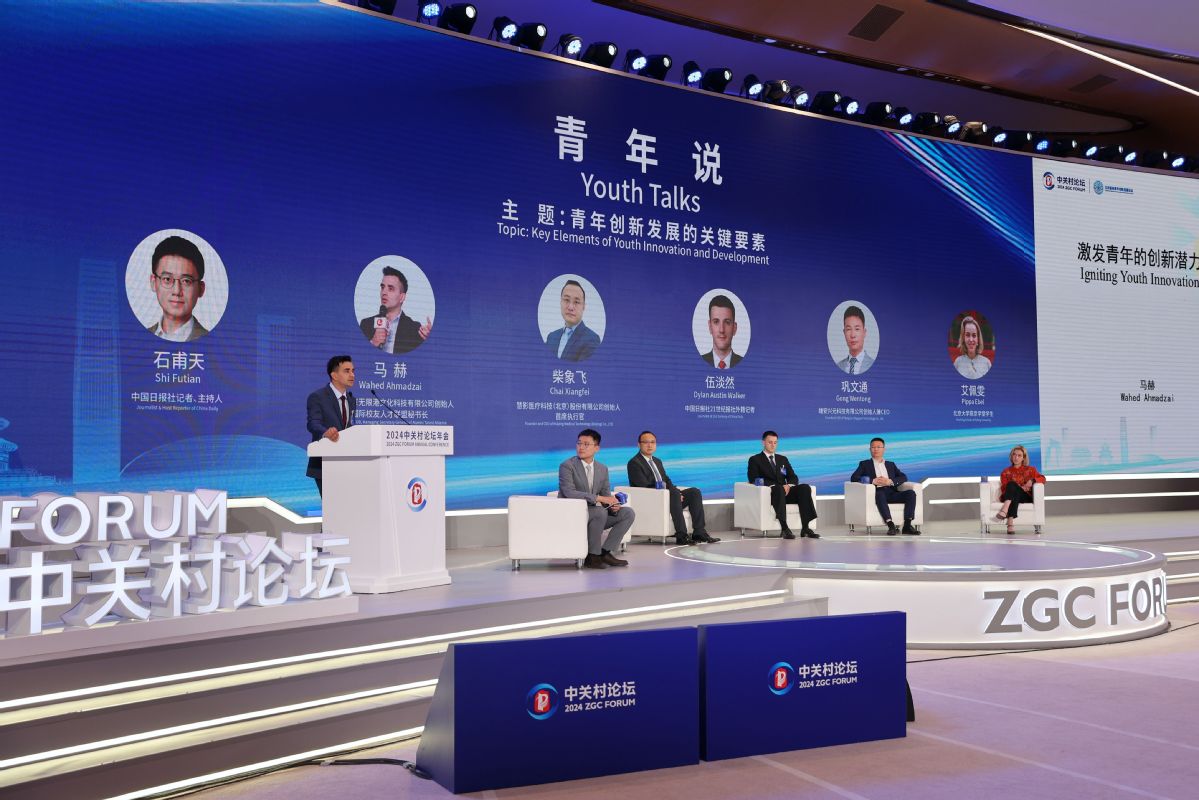
Young people play a pivotal role in innovation and deserve more support that encourages them to continue innovating, according to a consensus reached on Sunday in Beijing by a panel of experts and officials.
You Jun, head of the Organization Department of the Communist Party of China Beijing Municipal Committee, said that talented young people are a source of creativity and play a vital part in driving innovation and growth.
"Young people are among the most vibrant and creative groups," You said at the Beijing International Youth Innovation and Development Forum, which opened on Sunday in Beijing as a parallel session to the 2024 Zhongguancun Forum.
The event was attended by experts and officials from government, media and international organizations.
The official said that authorities in Beijing have been working to improve the environment for innovation and entrepreneurship through a series of policies and initiatives, including talent evaluation, research management and commercialization of achievements.
Boasting a high concentration of academic institutions, research facilities and high-tech industries, Beijing has become a magnet for global talent and resources, he added.
The remarks came as Beijing seeks to pool innovative resources from across the globe with the aim of building itself into a heartland of national politics, culture, international exchanges and science and technology innovation.
When addressing the forum's opening ceremony, Qu Yingpu, publisher and editor-in-chief of China Daily, an organizer of the event, emphasized the role of youth innovation in driving growth, and called for more efforts to create an environment that appeals to young talent.
Qu advocated an open, collaborative and mutually beneficial international innovation ecosystem. He said that China Daily will continue to share stories of friendly exchanges and collaborative innovation among young people worldwide through its multimedia platforms.
"Many cutting-edge technological projects are led by young individuals, and many tech startups are founded by young people," he said, adding that Beijing, where the national English-language newspaper has its headquarters, is racing to build a talent-friendly environment.
Zhang Xiangchen, deputy director-general of the World Trade Organization, said in a video speech that despite young people's intellectual advantages, they still face multiple challenges such as shortage of funds and a lack of opportunities.
"The whole society should work together and create opportunities for young people to get involved and achieve innovative development, and share the cost of their trial and error," he said.
The Sunday forum, themed "Gathering Youth Power and Promoting Innovation Development", focused on the talent sector.
It was jointly held by the Beijing Human Resources Bureau, China Daily, the Beijing Overseas Talents Center and the Talent Work Leading Group of the CPC Haidian District Committee.
The forum aimed to foster a consensus on supporting young talent globally, promoting the sharing of global innovative resources, and supplying talent for the high-quality development of Beijing as the national capital.
You, the Beijing official, expressed the hope that the forum will offer a glimpse into what young people really need, inspire them to exercise their full potential, and explore new pathways for the development of their talent.
"I hope that all talented young people here can gather for cooperation and friendship, plan for future development, and, with a bold and innovative attitude, shoulder the heavy responsibilities bestowed by the times," he said.
The Global Network for Innovation Services was launched at the forum, along with the Global Youth Talent Innovation Fund, which will bankroll relevant projects. As a global platform for the exchange and convergence of youth innovation talent and resources, the network aims to provide talent and intellectual support for the capital's high-quality development. It also aims to help Beijing implement the Global Development Initiative and build a community with a shared future for mankind.
Today's the day! The Beijing International Youth Innovation and Development Forum kicks off in the capital. With key talks on global talent integration, Beijing is shaping the future of youth-led innovation. Tune in, join the conversation, and be part of the change!
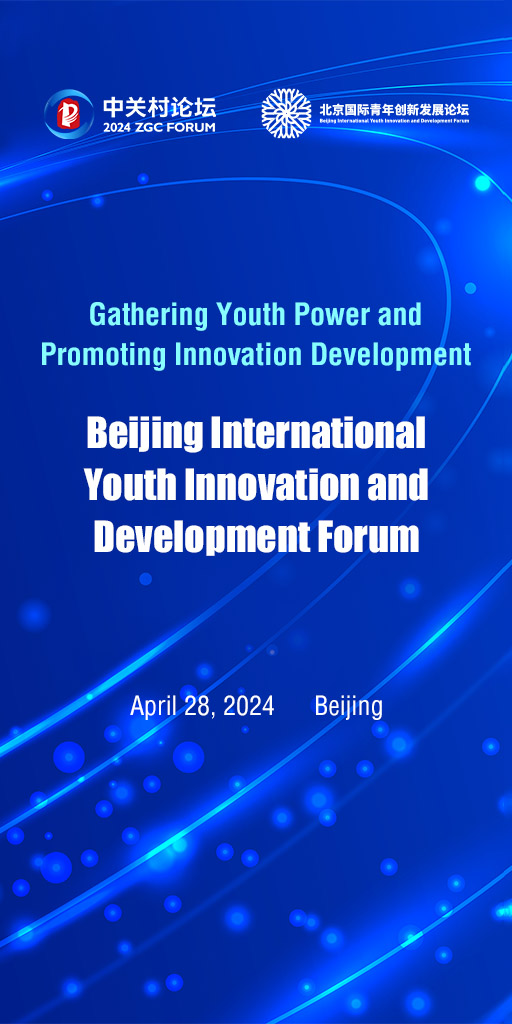

The Beijing International Youth Innovation and Development Forum, set to open tomorrow, focuses on the development of international young talents. Diverse ideas in innovation will be discussed. More highlights are waiting for you!
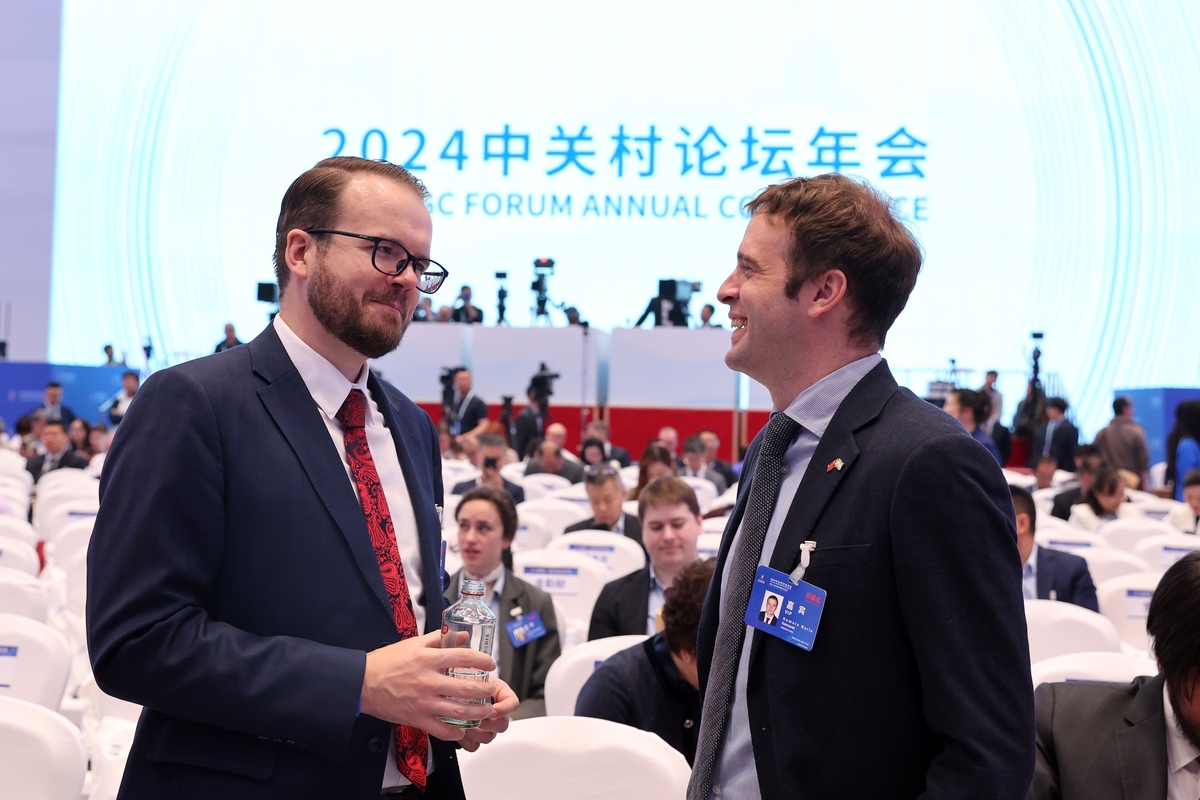
The opening ceremony of the 2024 Zhongguancun Forum Annual Conference was held in Beijing on Thursday.
Under the theme "Innovation: Building a Better World," the forum is attended by more than 150 foreign government departments and international organizations from over 100 countries and regions.
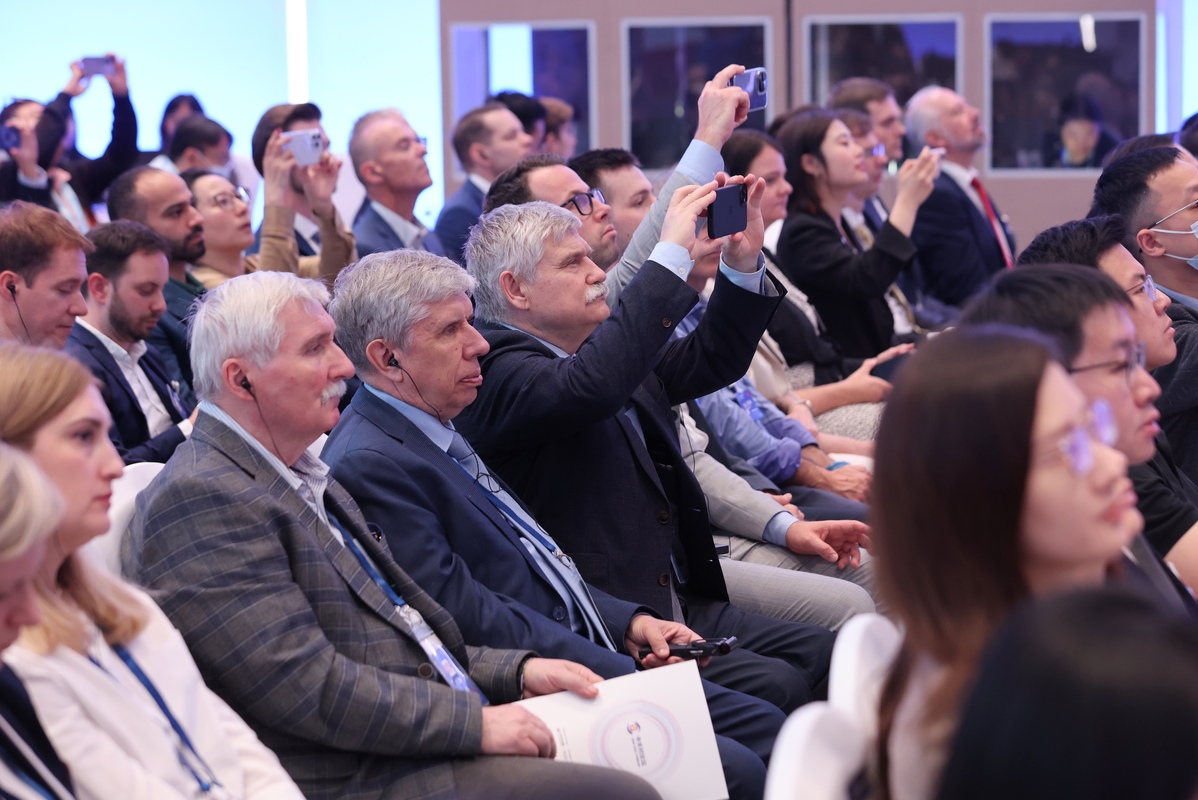
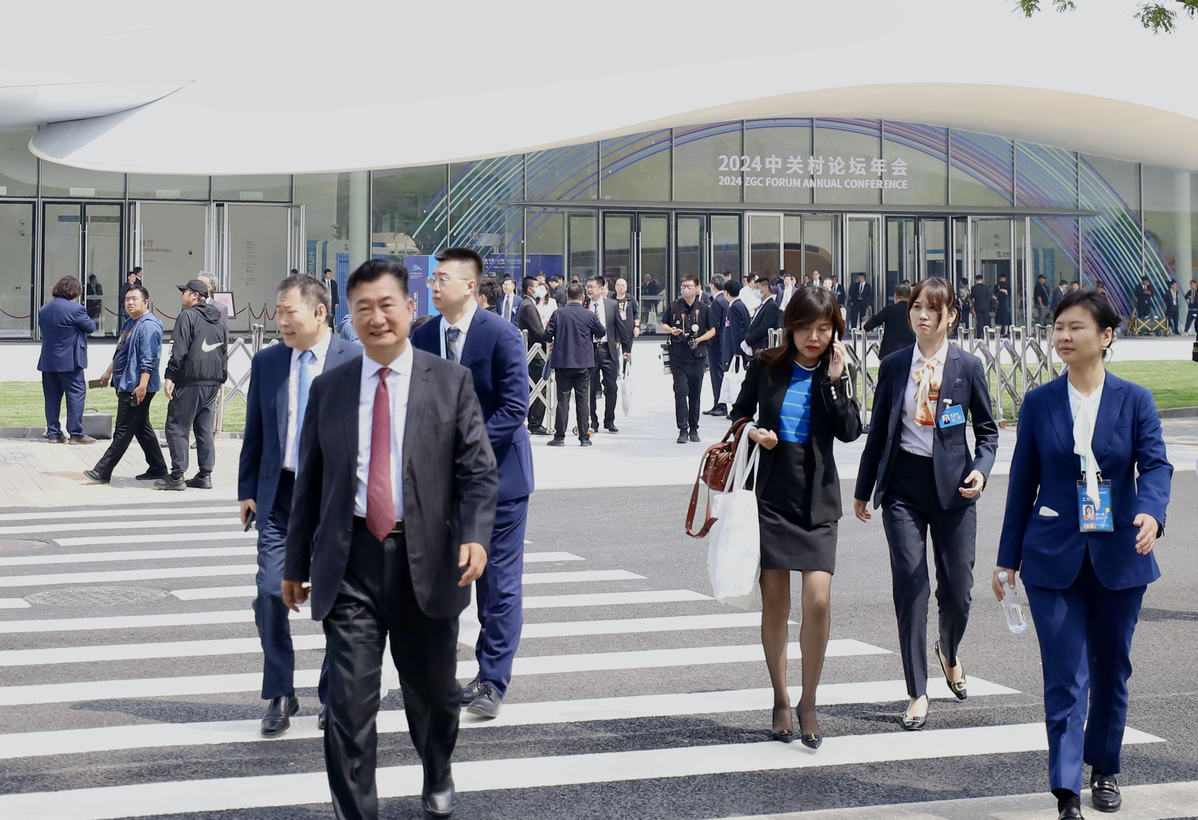

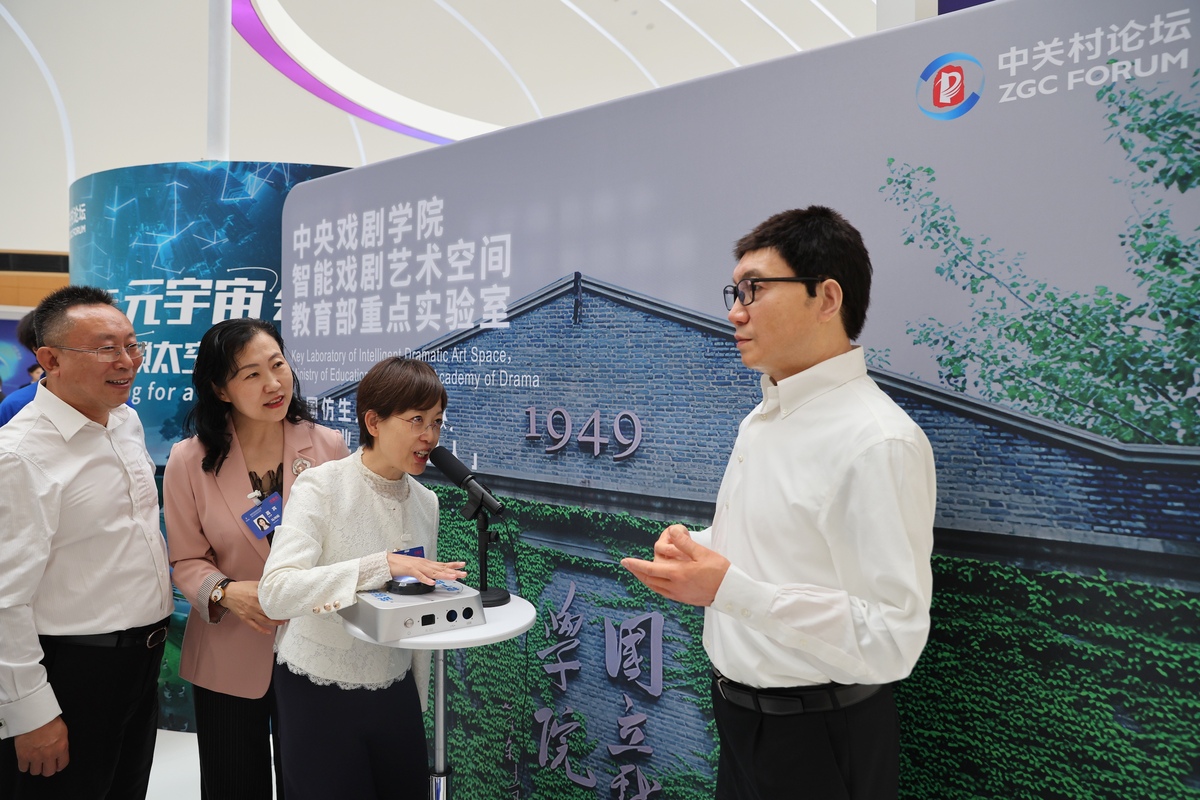
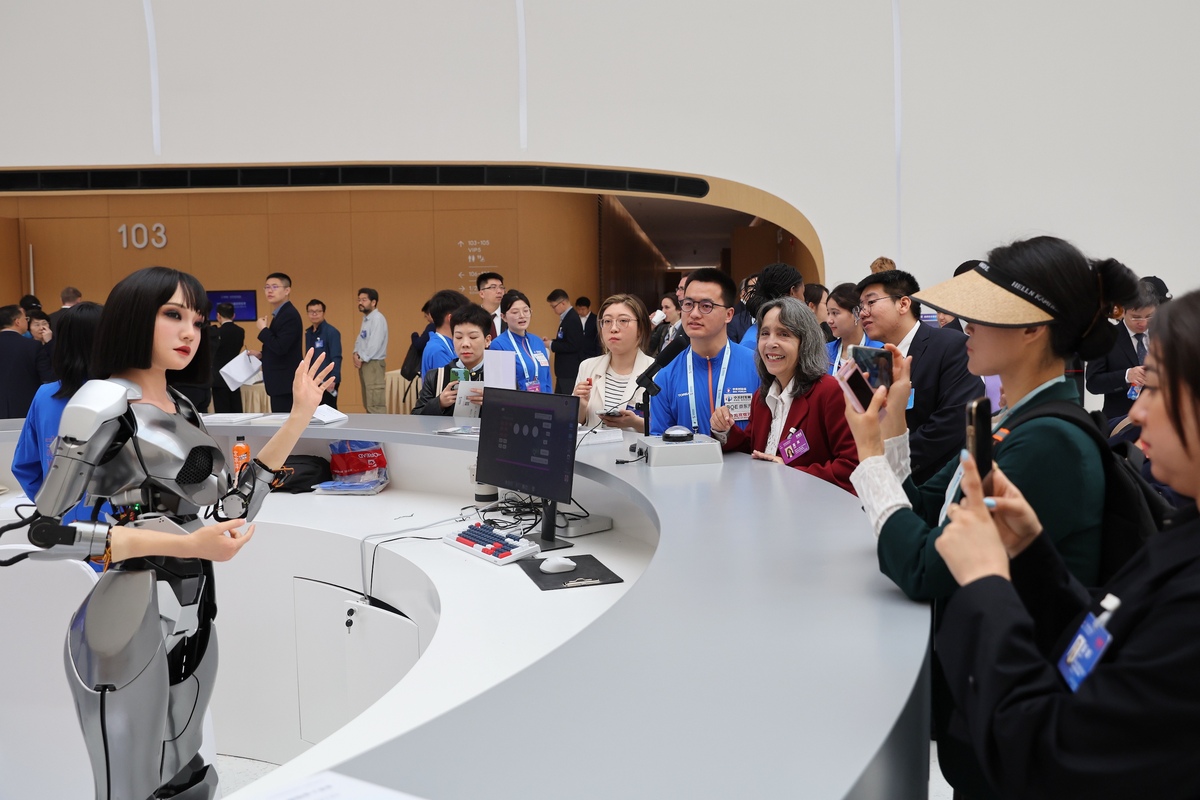
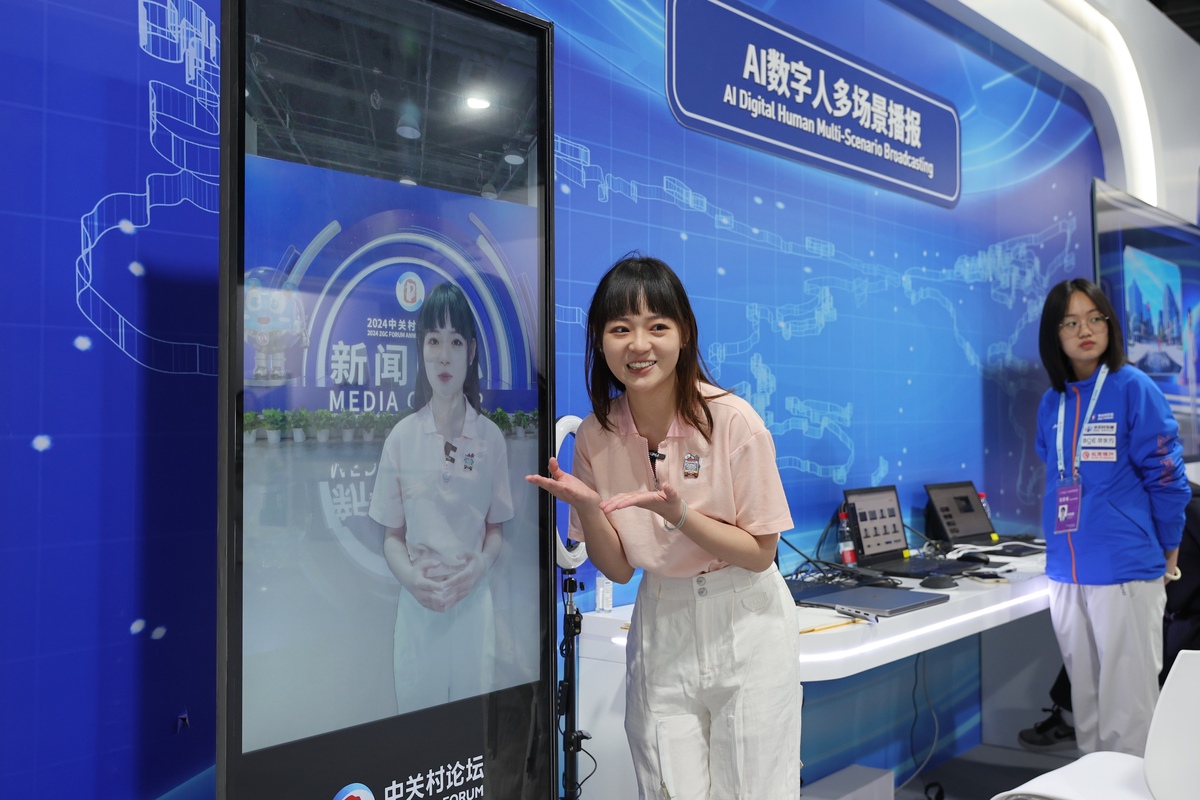
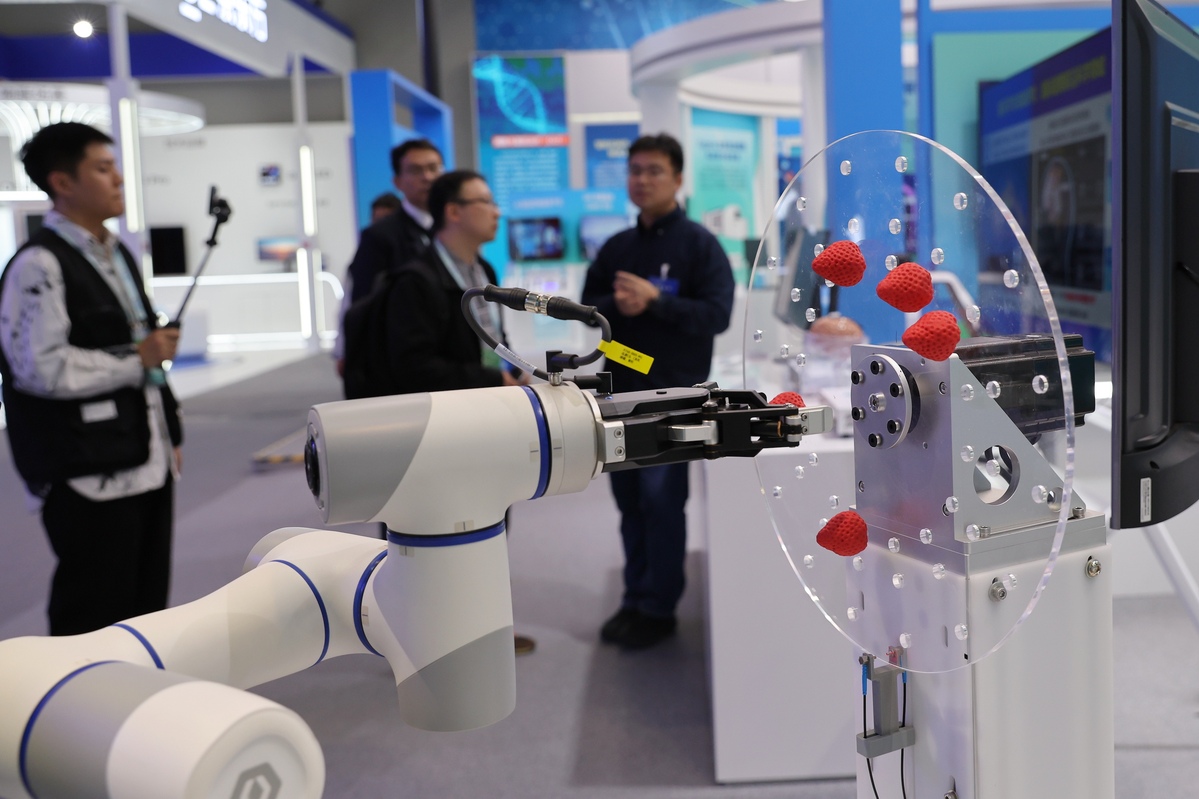
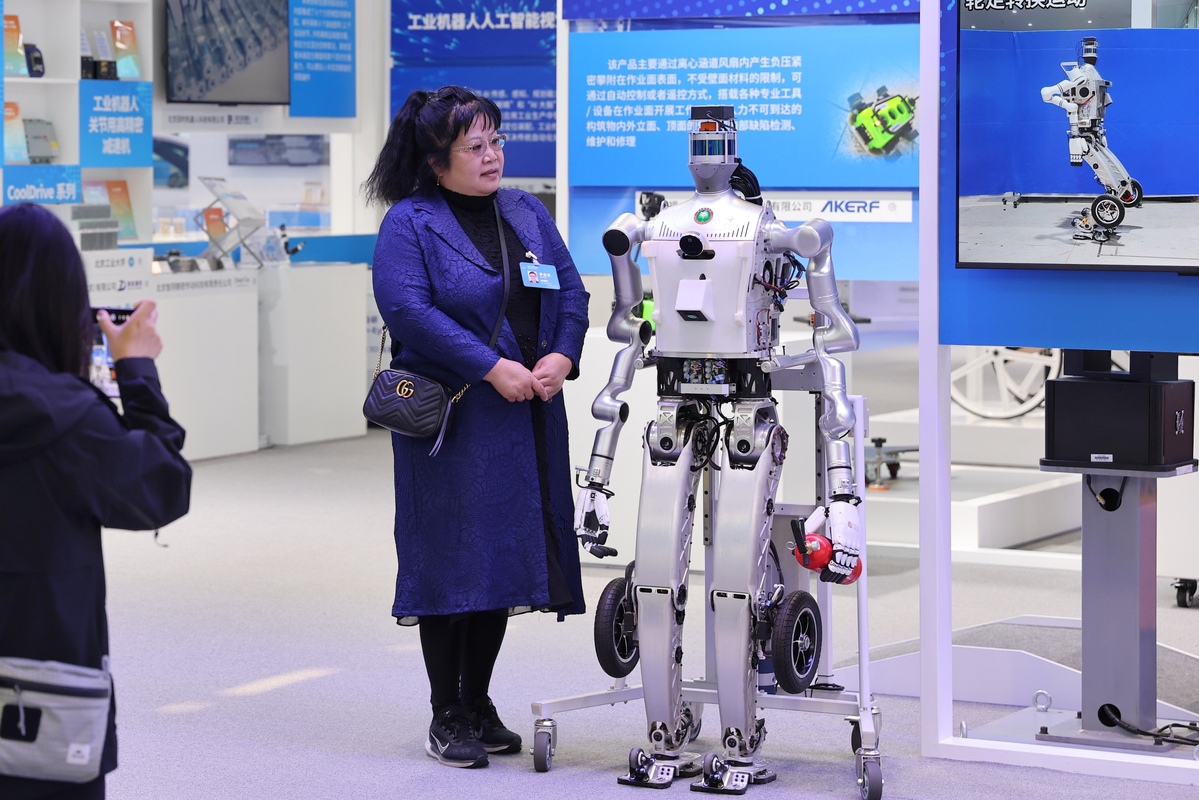
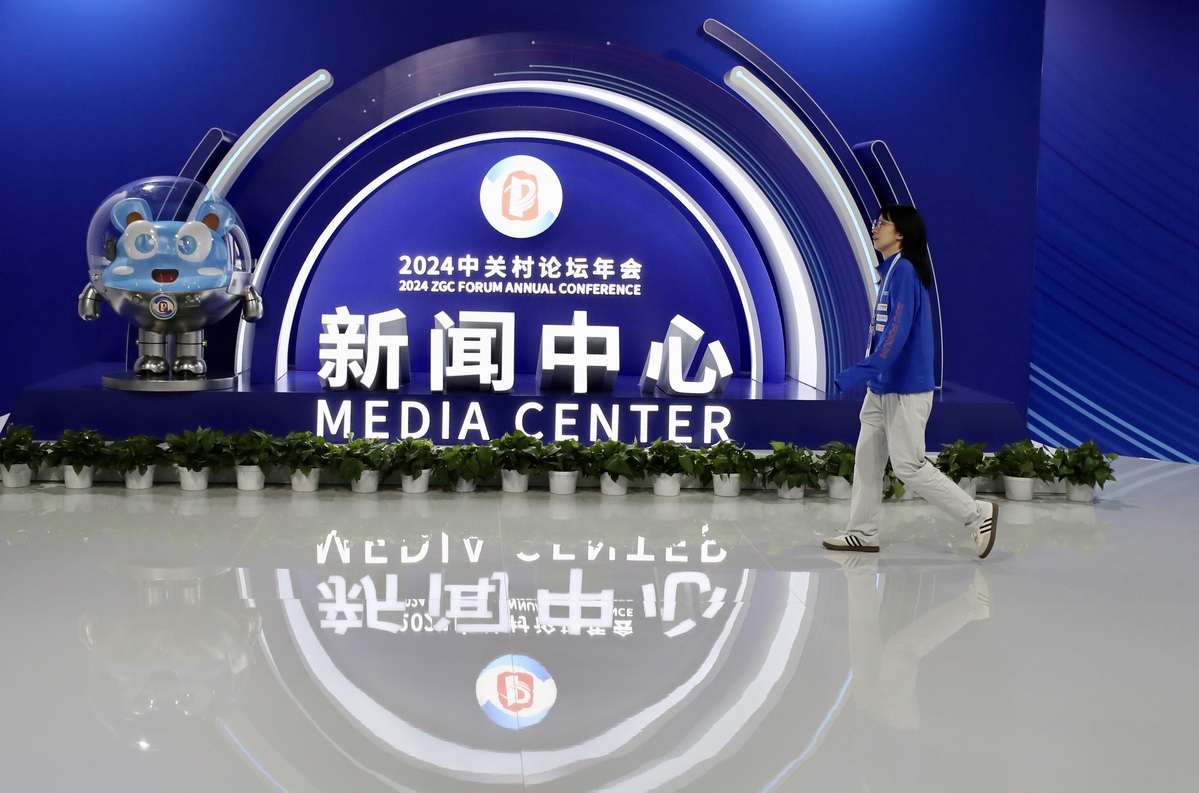
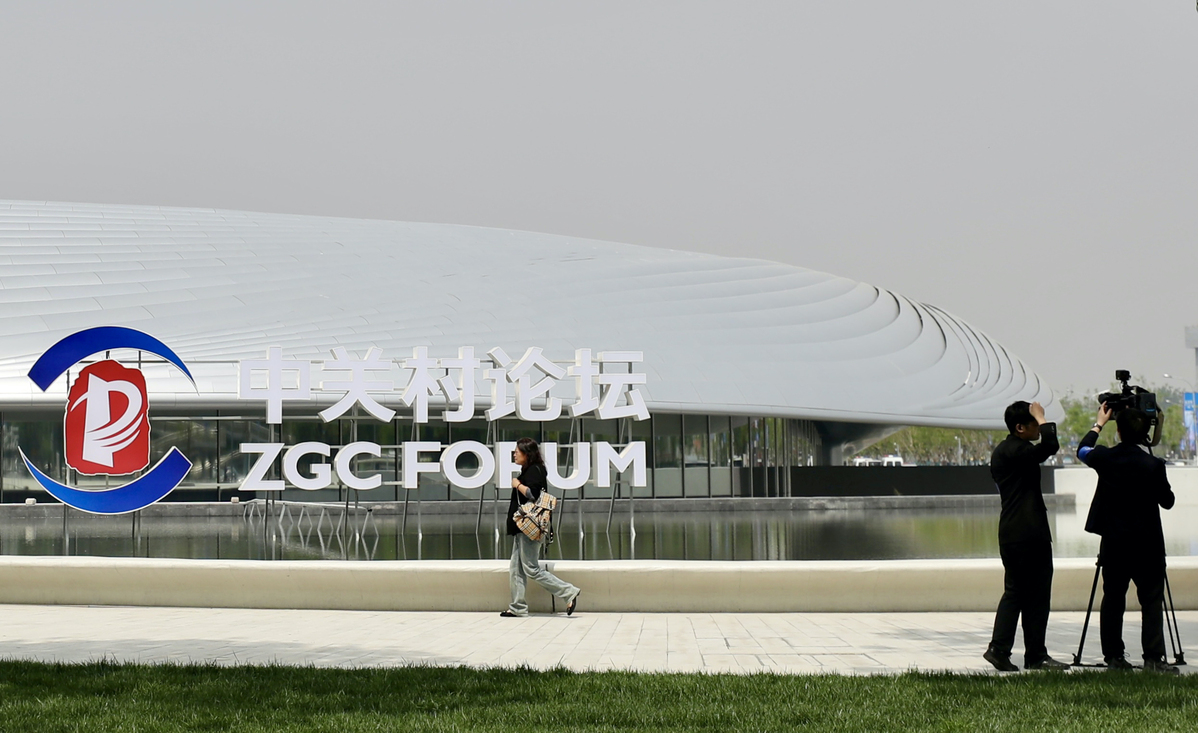
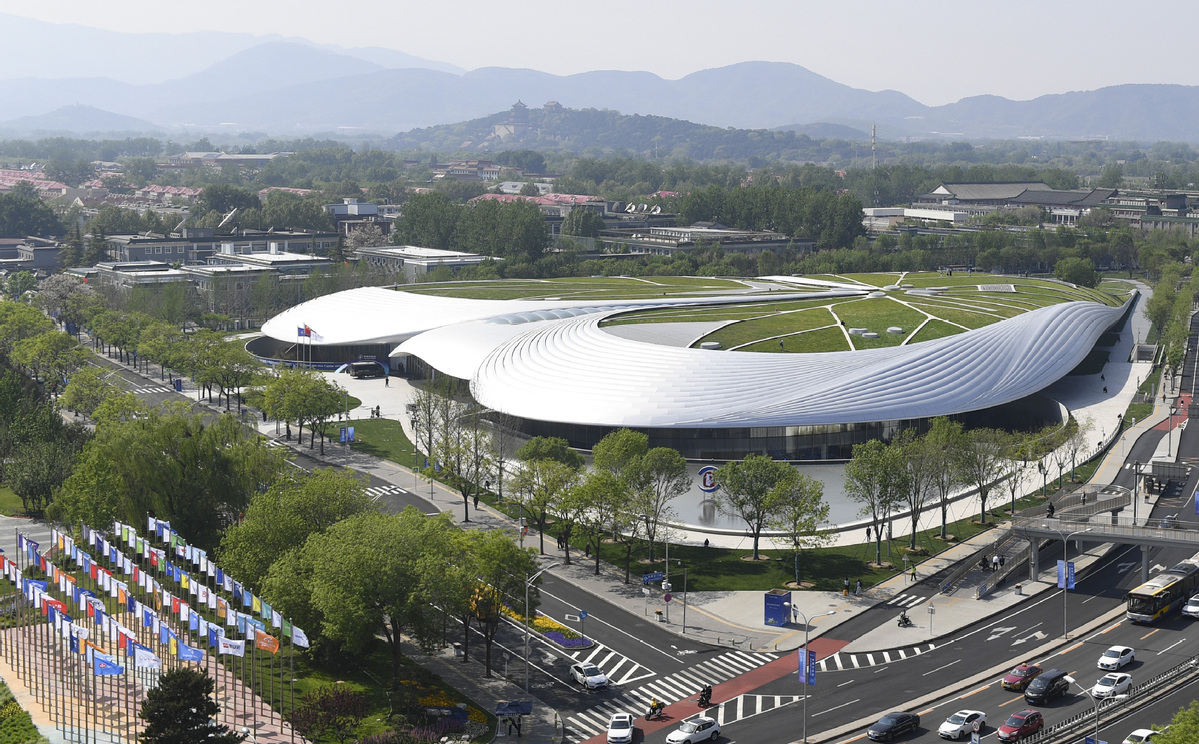
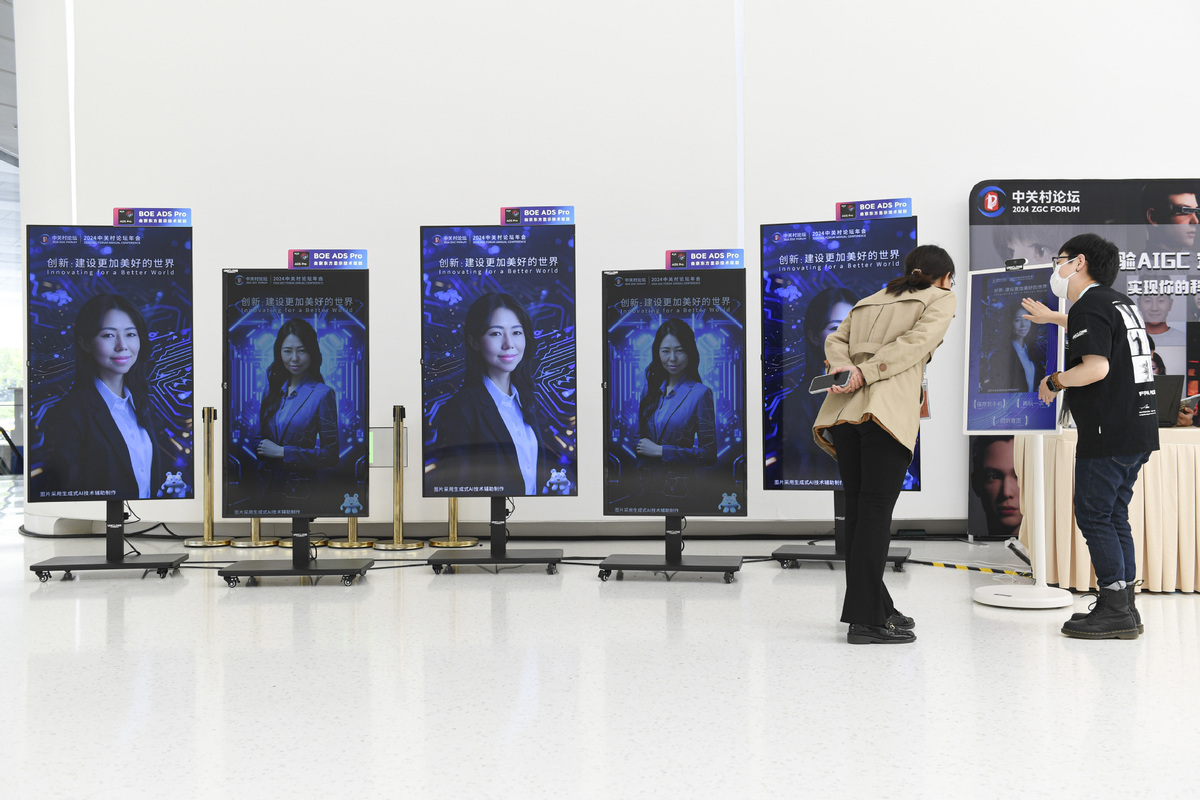
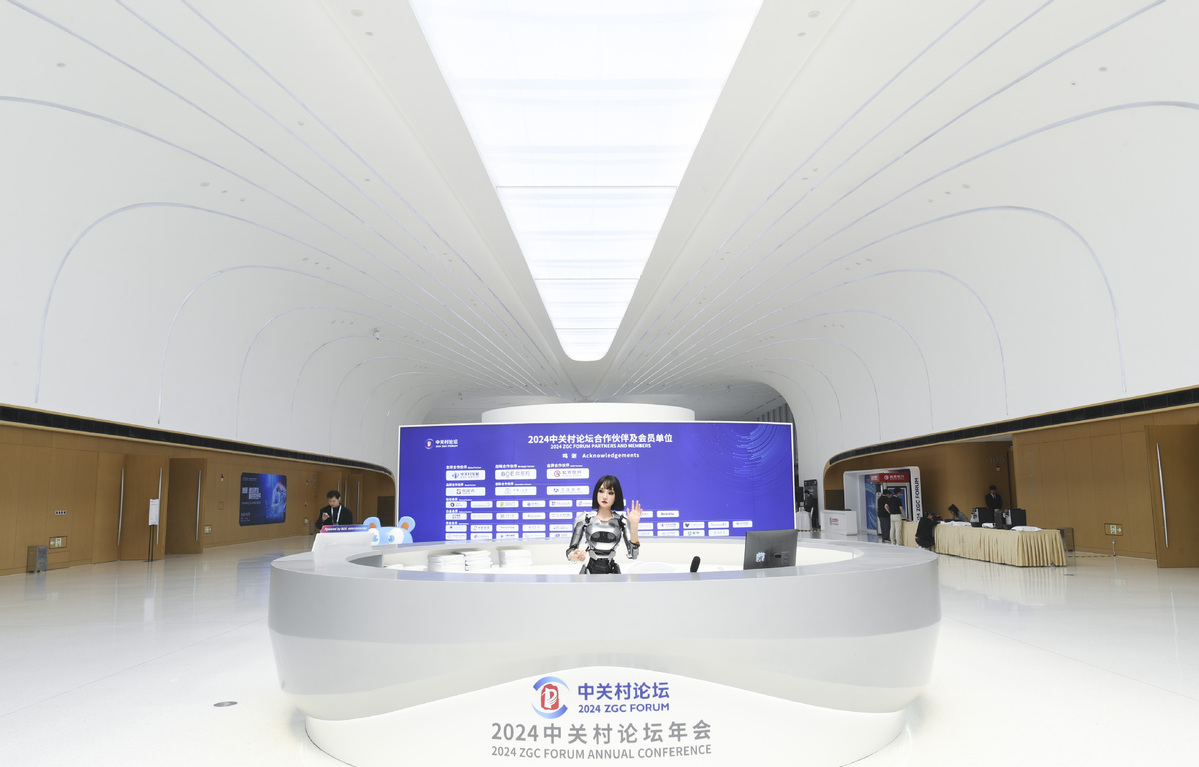
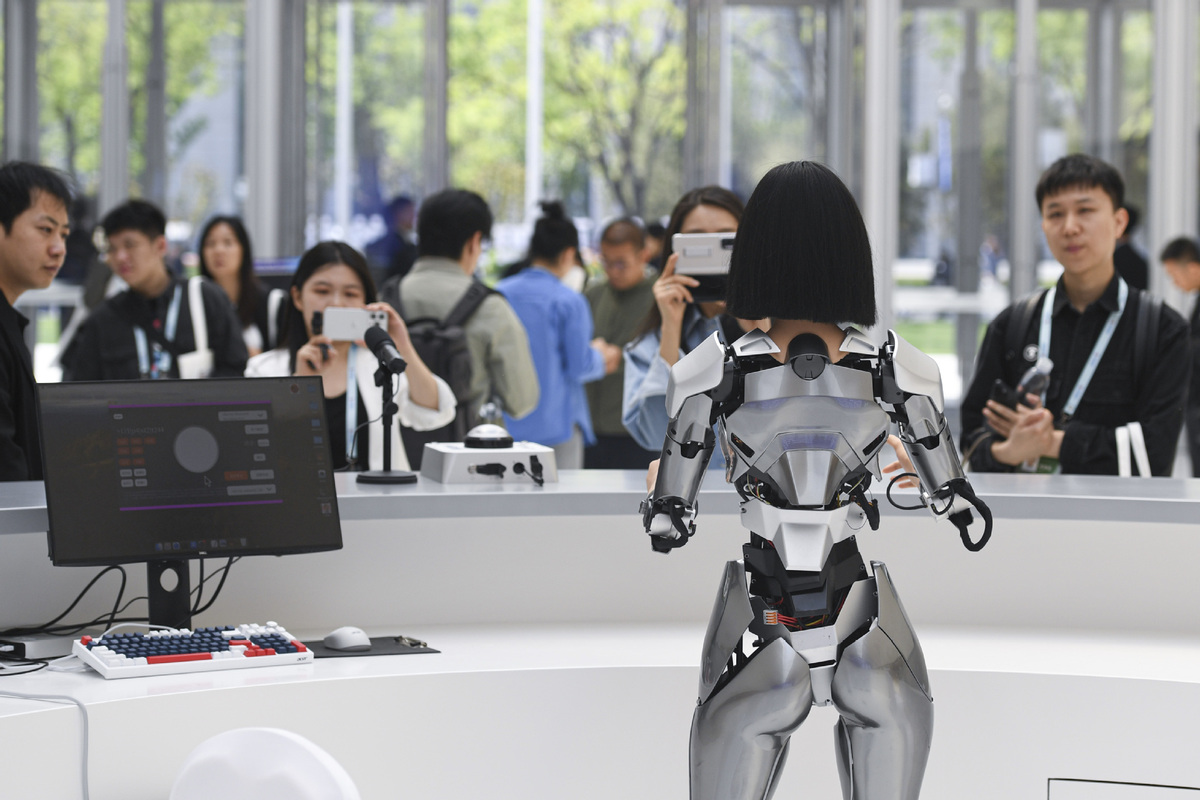
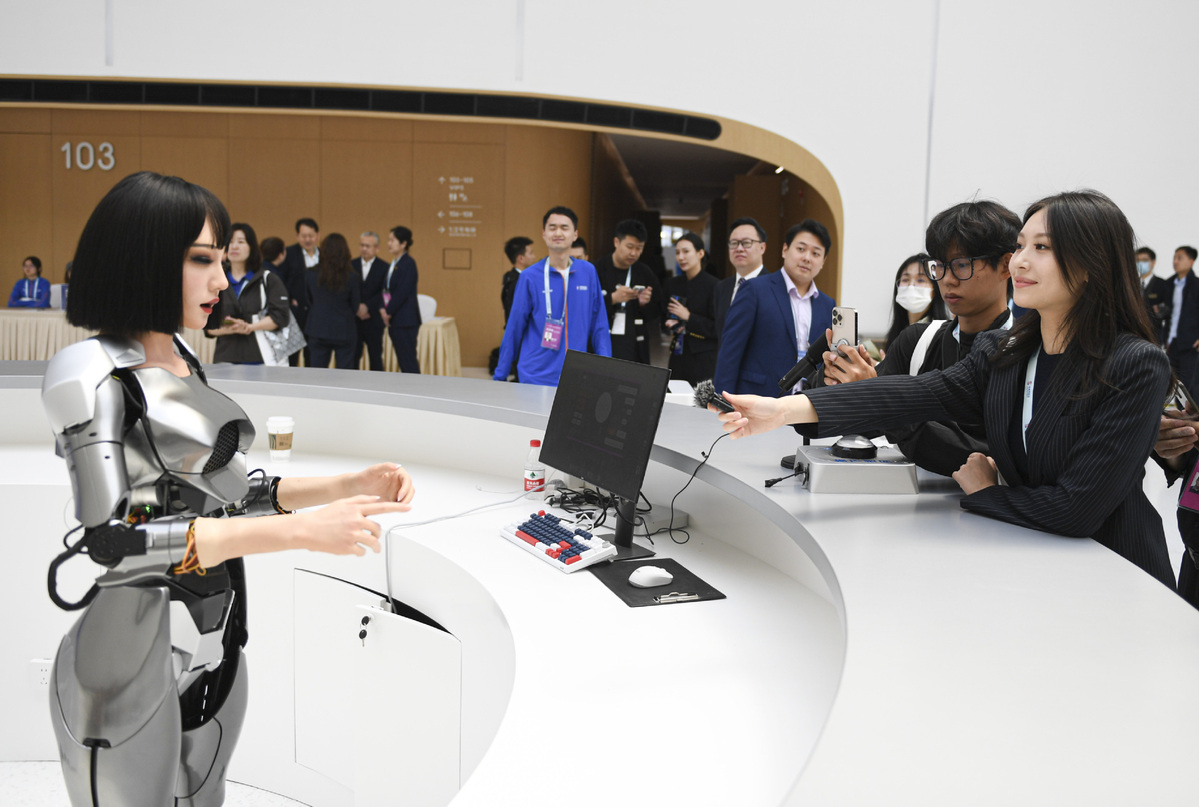
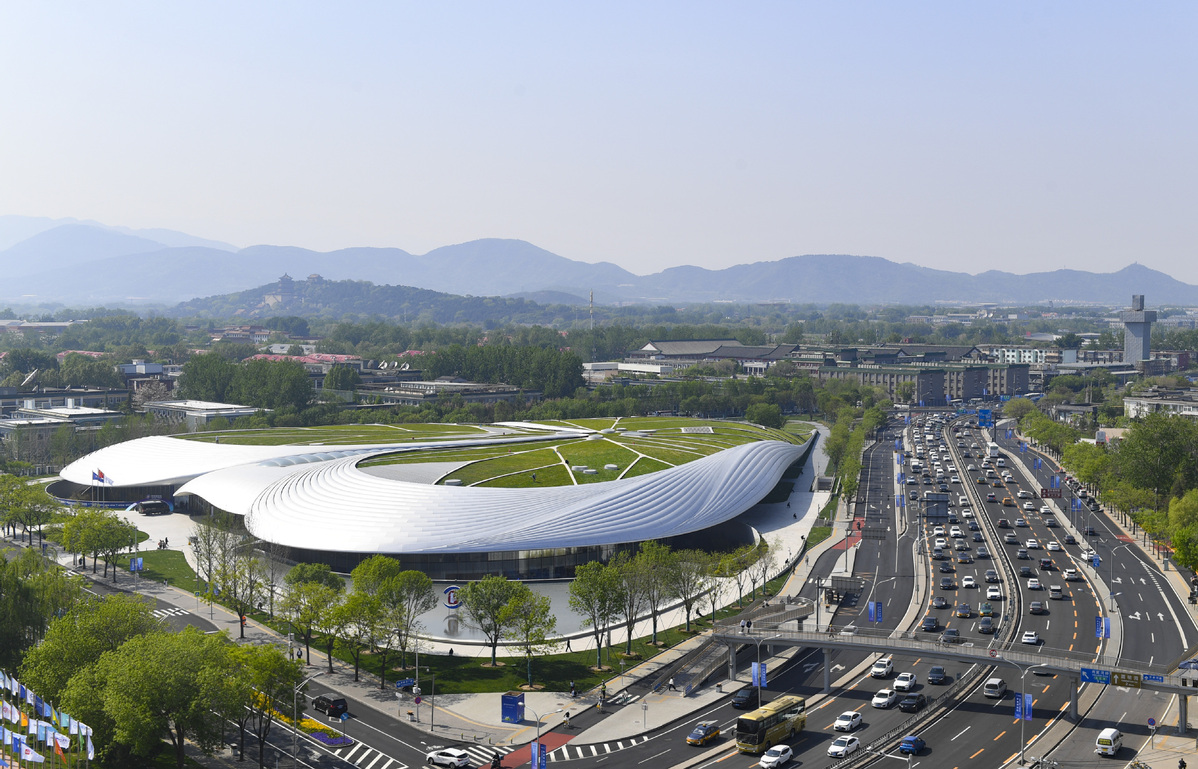


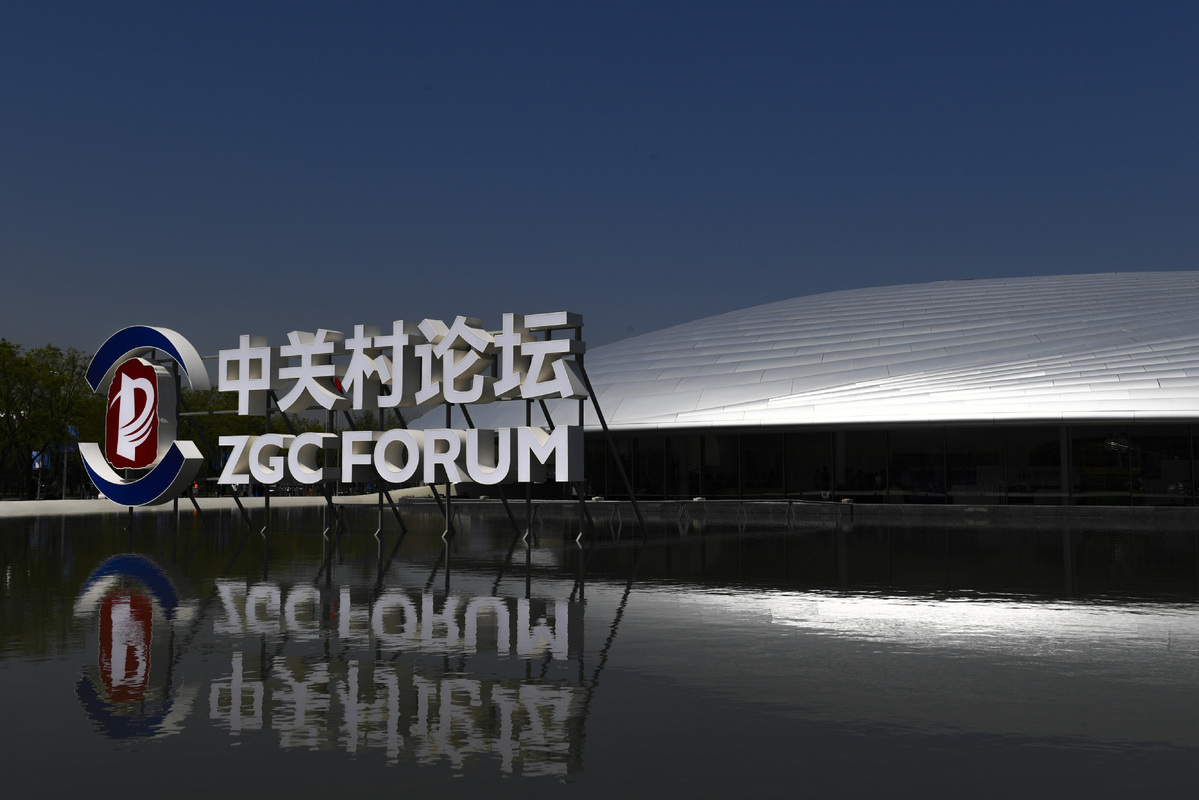

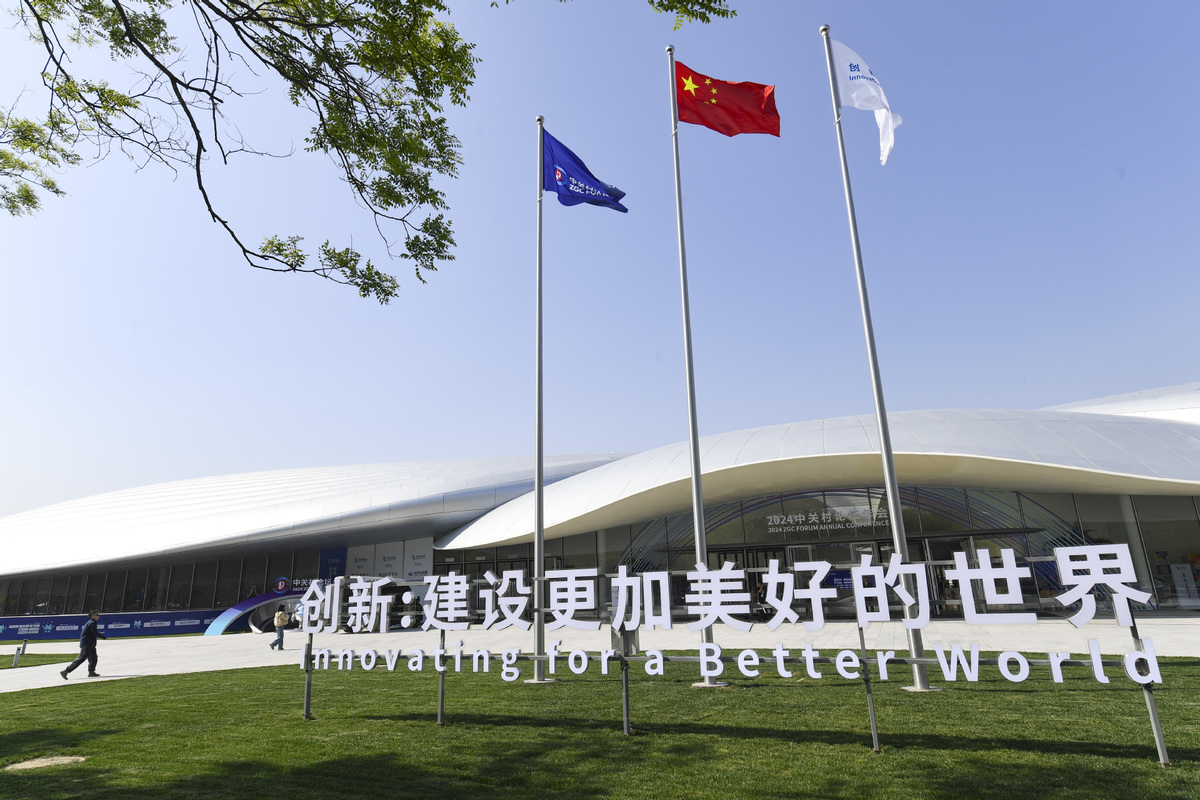

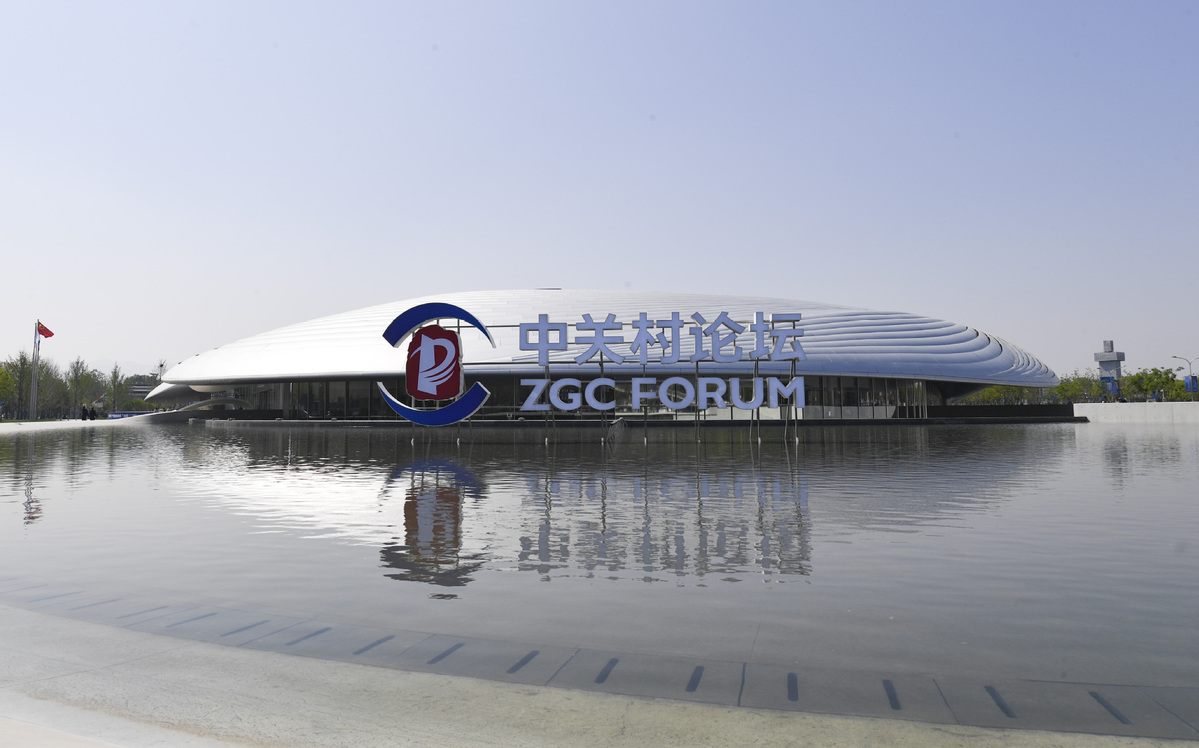
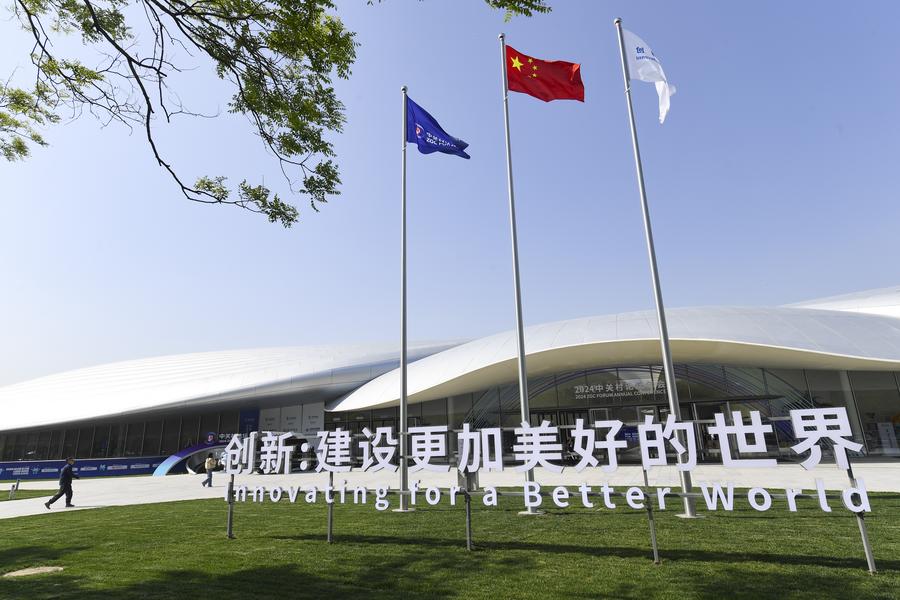
BEIJING -- The 2024 Zhongguancun Forum (ZGC Forum) kicked off on Thursday in Beijing and will focus on cutting-edge fields from artificial intelligence to life sciences and new materials during the five-day session ending next Monday.
Themed "Innovating for a Better World," this year's annual conference of the forum comprises five major sections, including meetings and technology trading. It promotes the exchange of brilliant ideas in 6G, blockchains, and other frontier areas at nearly 120 events.
A series of major scientific and technological achievements will be unveiled during this period.
The competitions in cutting-edge fields have attracted over 3,100 entries from 75 countries and regions, while the technology trading section has attracted over 6,000 projects from more than 40 countries and regions.
The forum has assembled participants from over 100 countries and regions, with more than half of its speakers coming from abroad, highlighting China's commitment to opening up and innovation cooperation.
Founded in 2007, the ZGC Forum, with its enduring focus on innovation and development, has evolved into a national-level open innovation platform and an international forum over the years.
Located in northwestern Beijing, Zhongguancun houses more than 17,000 national high-tech enterprises. It is China's first national high-tech industrial development zone and is known as "China's Silicon Valley."
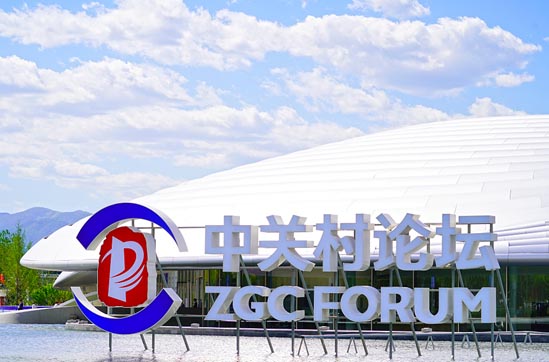
The Beijing International Youth Innovation and Development Forum is set to open at the Zhongguancun International Innovation Center on April 28. This event, serving as a parallel session to the 2024 Zhongguancun Forum, focuses on the talent sector with the theme "Gathering Youth Power and Promoting Innovation Development."
Its goals are to foster a consensus on supporting the development of international young talents, enhance the shared use of global innovative resources, and provide talent and intellectual support for the high-quality development of Beijing.
Young talents are encouraged to engage in international exchanges and cooperation and help Beijing culminate a more international and diversified pool of innovative resources that serve the construction of the capital's "four-center" functions, namely the national political, cultural, international exchanges, and scientific and technological innovation centers.
The Beijing Municipal Human Resources Bureau, China Daily, the Beijing Overseas Talents Center, and the Talent Work Leading Group of Haidian District Committee are jointly hosting the forum, which will invite distinguished guests from international organizations, government departments, diplomatic embassies, and multinational companies to deliver speeches on site.
It will also feature keynote presentations from prominent universities, enterprises, and international organizations in the education and technology sectors on how to unite youth power to drive innovation development, and foster discussions with outstanding young representatives in innovation and entrepreneurship on the key elements of youth innovation development.
Organizers said that this forum would launch the Contact Beijing•Global Network for Innovation Services (GNIS). As an essential part of Contact Beijing, GNIS will focus on young talent and use targeted services to build a global innovation resource cooperation platform. Additionally, the forum will sign agreements for joint training of international talents, and release the "2024 Global Youth Science and Technology Innovation Development Report" to foster a conducive environment for the collaborative development and innovation of young talent globally.
The Beijing International Youth Innovation and Development Forum, initiated by the Beijing Overseas Talents Center in 2021, was created to solidify innovative ideas from the youth and stimulate their vitality. Contact Beijing•GNIS will create a global platform for the exchange and convergence of global youth innovation talent and resources, provide talent and intellectual support for the capital's high-quality development and contribute Beijing's strength to the implementation of the Global Development Initiative and the building of a community with a shared future for mankind.
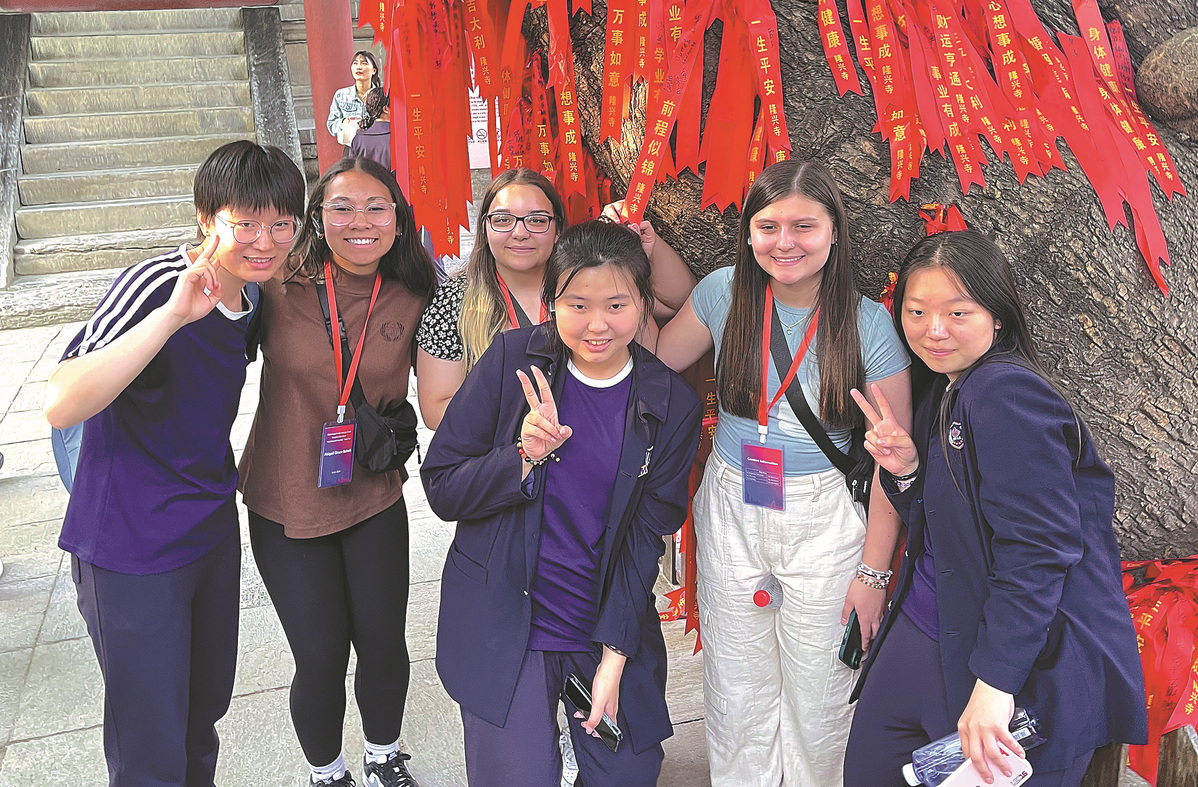
At many tourist attractions in China, red ribbons that bear visitors' signatures and auspicious phrases, such as wishes for career success or a healthy family, are tied to trees, handrails and other objects for good luck.
The red ribbons proved popular on Saturday among a United States delegation of students from Muscatine High School in the US state of Iowa and their Chinese peers from Shijiazhuang Foreign Language School in Hebei province.
While gathering around a kiosk selling the red ribbons at Longxing Temple in Zhengding county, Hebei, the high-spirited students could be heard exclaiming "Look what I've got","Put it here", or "I love this one!"
Known for its outstanding architecture, frescoes and stone sculptures, the famous Buddhist temple is a national-level cultural heritage protection site.
It has been well preserved, thanks to the efforts of people including President Xi Jinping when he was deputy secretary of the Communist Party of China's Zhengding county committee in 1982-83 and secretary from 1983 to 1985.
At that time, Xi spent a great deal of time and energy to get a special fund allocated to the county for the restoration of ancient buildings and sites, including Longxing Temple.
Xi was also among those who worked on building the bonds between Zhengding and the Iowa city of Muscatine, as he led a five-person delegation to places including Muscatine during a visit to the US in 1985.
During the students' short stay at the serene temple before dinnertime on Saturday, the young people from China and the US were able to leave a mark of their new friendship.
Three of the US students partnered with three Chinese girls to buy a red ribbon.
Yuan Yifan, one of the three third-year high school girls from Shijiazhuang Foreign Language School, paid for the red ribbon, which cost her 10 yuan ($1.38).
Printed in yellow on the ribbon were two phrases in Chinese -"splendid future" and "accomplishments in career". Red and yellow are auspicious colors that are frequently used in Chinese art.
The six girls got along well during their trip in recent days, so they all signed their names on the same red ribbon and used their phones to take some photos, and then Yuan tied the ribbon to one of the large trees in the temple's courtyard.
"I just made a wish for health and good luck and to be happy in future college years for every one of us," said Yuan.
The three girls from the US knew one another before the visit, as did their three Chinese peers.
"The six of us got acquainted with and knew one another better in a natural process," Yuan said.
Leiah Marie Lobdell, one of the girls from Muscatine, said,"We have grown close in little time. They are all amazing people."
Lin Yihang, another Chinese girl in the group of six friends, noted that she had visited the temple when she was younger.
"We have gained a brand-new understanding of this place by traveling alongside our American friends and being their tour guides. We want to bring them closer to our culture, including the religious culture," Lin said.
"We had not anticipated that we could be such great friends as facilitated by this tour," she added.
Caydn Alexys Caliger, another girl from Muscatine High School, said the Buddhist statues and frescoes in the temple were a little strange to her.
"It (the temple) was very beautiful. I saw a lot of interesting things and I wanted to learn more about the culture here," Caliger added.
The US student delegation is the second one sent by Muscatine High School this year. The first delegation visited in January.
The visits are part of a program announced by President Xi in November in San Francisco to invite 50,000 young people from the US to China over the following five years for exchange and study.
Xi wrote a reply letter to the first Muscatine High School delegation in February and sent them a Chinese New Year greeting card.
The second delegation arrived in Beijing on Wednesday before going to Hebei, and the trip will also take them to Shanghai on Monday, the last leg of their China tour.
Culture, nature and friendship were among the highlights of their visit to Hebei from Friday to Monday.
They went to the Shijiazhuang Zoo to see the giant pandas, toured the Hebei Museum to experience ancient Chinese culture and watched the China Impression multimedia musical performance presented by teachers and students from Shijiazhuang Foreign Language School.
Students from both nations witnessed the inauguration of the China-US Friendship Youth Woods on Saturday at a park in Zhengding and planted trees, including American red maples.
"I was greatly amazed by the creative idea of planting the woods. The trees will grow, and so will the kids," said William Zhang, a professor of English language studies at Des Moines Area Community College in Iowa and chair of the Iowa Sister States Hebei Committee.
"I told the American students,'Don't forget to travel back here after you grow up and have another look at the trees you planted'," he added.
